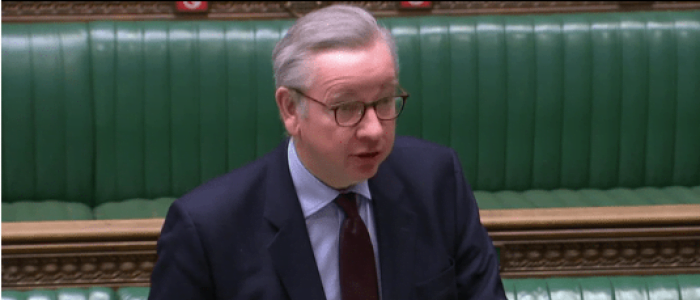Keeping faith on the agenda as MHCLG “levels up”

We have been very proud of the ways in which we have worked closely with the Ministry for Housing Communities and Local Government during the past few years, never more so than during the pandemic. But no longer will you hear us talk proudly of our partnership with “MHCLG” (or need to try to remember what it means). For emerging from the chaos of last week’s cabinet reshuffle and all the talk of the hires and fires, the winners and losers, and the politics behind it all is a new minister at the head of the department with a new title and agenda, and with that, a new acronym.
Replacing Robert Jenrick MP, Michael Gove MP has been installed by the Prime Minister as Secretary of State for Levelling Up – a clear signal to the government’s central mission to “level up” every part of the UK. As MHCLG subsequently transitions to now become the Department for Levelling Up, Housing and Communities (DLUHC), its remit widens significantly, with Gove now tasked with ‘[driving] cross-Whitehall efforts to deliver a programme of tangible improvements in every part of the UK as we build back better from the pandemic, and deliver on the people’s priorities’.
Amid these transitions in personnel and priorities, we wish to urge the department to keep engagement with faith groups at all levels of government at the top of the agenda.
The main reason for this is that faith engagement is not separate from the core mission of levelling up the UK and building back better from the pandemic. As we at FaithAction have been emphasising since our 2020 conference, faith communities and faith-based organisations have proven during the pandemic that they ought to be considered as key partners in any efforts to ‘build back better’, and as demonstrated in the Keeping the Faith report, most local authorities across the UK have depended on faith groups throughout the pandemic and wish to continue in that collaborative spirit during the rebuild.
A “new deal” with faith
Furthermore, when Danny Kruger MP was commissioned by the Prime Minister in 2020 to evaluate how the government might go about ‘levelling up our communities’, one of the central recommendations he produced was a ‘new deal with faith communities’. With that in mind, it is a positive sign that Lord Greenhalgh has been reappointed in the department, maintaining his brief as Minister for Faith. Greenhalgh has championed the role of faith communities in responding to local needs throughout the pandemic, and recently announced a £1 million Faith New Deal Pilot Fund, which seeks to ‘capitalise on efforts to help communities during lockdown’.
The new pilot fund is described as a direct response to the reports produced by Kruger and the APPG on Faith and Society, and is an exciting step and a promising sign of the intent of this government to work with faith communities and respond to the reports demonstrating their worth. It is also promising to see the Kruger himself will be joining the department as parliamentary private secretary.
Delighted to be joining @michaelgove and the team at @luhcgovuk (levelling up, housing, communities) as Parliamentary Private Secretary (v junior non ministerial post)
— Danny Kruger (@danny__kruger) September 21, 2021
There are some who believe that the close partnership working witnessed during the pandemic was a ‘honeymoon phase’ which is likely to cease when we move beyond the present crisis. Though experience may support that scepticism, preliminary findings from follow up research to the Keeping the Faith report (to be published in the next few months), suggest that faith communities have demonstrated their worth at a scale that cannot easily be ignored, nor do local authorities desire to forget it. We therefore have reason to be optimistic about the future of faith’s relationship with government, but not blindly so. The present level of collaboration, and the resulting benefits to local communities, will not remain without work. Steps need to be taken to embed the present, close working partnerships in frameworks, agreements, and ways of operating that secure them for the future, beyond the pandemic, and beyond the individuals currently at the helm.
Building on the Faith Covenant
Securing this relationship requires steps to be taken by all parties. For this reason, we are excited to be witnessing many new local authorities – at district, borough and county level – coming forward to express interest in the Faith Covenant, and Kruger’s idea of a “new social covenant” with faith communities that may be based upon it. I encourage you to take a look at the Covenant and consider whether it might support your own efforts to secure the momentum of faith-council collaboration in your own local area. We also support the announcement of the Faith New Deal pilot fund, and the government’s signal of intent to learn from this pilot to work more effectively with faith in the future.
As we like to say at FaithAction, “faith is first in and last out” when it comes to serving local communities, and “faith reaches parts nothing else can”. With the unique assets of faith communities in mind, we urge Michael Gove to take a keen interest in these developments and to champion partnership working with faith as a central element to his mandate to build back better and level up every community in the UK. As a national infrastructural body for faith-based social action in the UK, we look forward to helping to shape this endeavour and work closely with the new DLUHC in the years to come.



